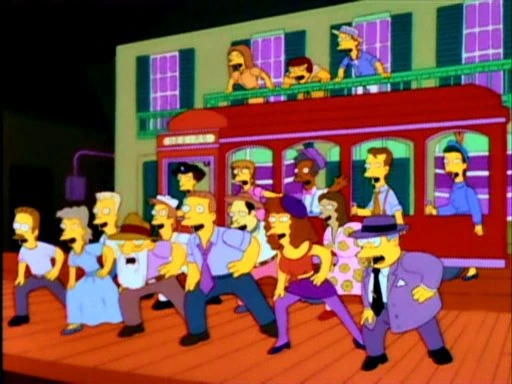In its earliest years on television, The Simpsons generated a lot of controversy from a myriad of figures, but mostly those on the political right. Educators claimed the character of Bart, the young child who dislikes school, set a bad example for young children. In 1992, President George H.W. Bush declared, “We are going to keep on trying to strengthen the American family, to make American families a lot more like the Waltons and a lot less like the Simpsons.” Bush’s comment was remarkable in that a sitting president of the United States attacked a cartoon family for its lack of moral values. The show weathered these early criticisms and became the defining comedy of the 1990s. In the ensuing years, the show still flirted with controversy, especially in the season 4 episode “A Streetcar Named Marge” with a satirical song attacking New Orleans.
First, some context. In the episode, Marge, wanting to expand her horizons, auditions for the role of Blanche DuBois in a community theater production of A Streetcar of Desire. Her audition for the new musical version of the famed Tennessee Williams play goes poorly. The director, Llewellyn Sinclair, does not think Marge can portray the constantly put-upon Blanche until he witnesses a beaten-down Marge take a phone call from Homer. Seeing her world-weariness, he casts her in the part. Marge, struggling with a scene where she smashes a bottle and threatens the character of Stanley Kowalski (played by Ned Flanders), learns to channel her anger at Homer, who has not been supportive of her endeavors, into her performance. The episode also contains an extended tribute to the 1963 movie The Great Escape as baby Maggie orchestrates an escape from the tyrannical Ayn Rand School for Tots, where the family has dumped her while Marge pursues her theatrical dreams.
The episode is a pitch-perfect satire of both community and Broadway theater. Sinclair declares “I've directed three plays in my career and I've had three heart attacks. That's how much I care, I'm planning for a fourth.” He also points to a review of one of his earlier plays titled, "Play enjoyed by all." At one point, Marge is swinging around the theater on ropes as smoke fills the stage accompanied by a laser show. Lisa suggests that the scene is meant to show “Blanche’s descent into madness.”
Controversially, the episode also contained a song from the musical about the city of New Orleans. The lyrics are below:
Long before the Superdome, where the Saints of football play,
lived a city that the damned call home, hear their hellish Rondelet. New Orleans!
Home of pirates, drunks and whores. New Orleans!
Tacky, overpriced souvenir stores.
If you wanna go to hell you should take that trip to the Sodom and Gomorrah on the "Mississippi". New Orleans!
Stinking, rotten "vomity" vile. New Orleans!
Putrid, brackish, maggoty, foul. New Orleans!
Crummy, lousy, rancid and rank. New Orleans!
The song parodies the song “No Place like London” from the musical Sweeney Todd that described London as “a hole in the world like a great black pit/ And the vermin of the world inhabit it/ And its morals aren’t worth what a pig would spit/ And it goes by the name of London.”
A New Orleans TV critic who received the episode before it aired did not see the song as satire, however. He published the lyrics, sans context, in a newspaper the day the episode aired, prompting complaints from New Orleanians. The complaints prompted the president of Fox to release a statement saying, “It has come to our attention that a comedic song about New Orleans in tonight's episode of "The Simpsons" has offended some city residents and officials. Viewers who watch the episode will realize that the song is in fact a parody of the opening numbers of countless Broadway musicals, which are designed to set the stage for the story that follows. That is the only purpose of this song. We regret that the song, taken out of context, has caused offense. This was certainly not the intention of "The Simpsons" production staff or Fox Broadcasting Company.”
The Simpsons, for their part, threw together a chalkboard gag for the very next episode declaring “I will not defame New Orleans.” As Simpsons producer Al Jean said, “We didn’t realize people would get so mad. It was the best apology we could come up with in eight words or less.”
The controversy blew over rather quickly, especially after Bart Simpson served as the Grand Marshal of the Krewe of Tucks during Mardi Gras in 1993. Now "A Streetcar Named Marge" ranks amongst the best episodes the show ever produced, thanks to cleverness, satire, and willingness to skewer "rancid and rank" New Orleans.


No comments:
Post a Comment